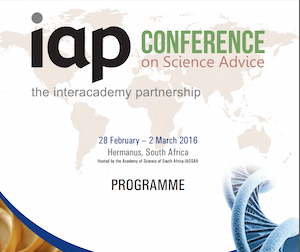


Scientists from around the world will meet in Cape Town later this month to discuss how best science can guide sustainable development globally.
Hosted by the Academy of Science of South Africa (ASSAf), the InterAcademy Partnership (IAP) Conference and General Assembly 2016 will take place from 28 February to 2 March 2016 in Hermanus, under the theme "Science Advice".
There is a growing movement internationally to bring together science advisors to share best practices and form a network to deal with global challenges, such as food security and climate change.
Science is also at the heart of the United Nations sustainable development goals (SDGs). However, integrating the best science into the plans of government and others working towards the SDGs, remains a challenge.
The conference will bring scholars from South Africa and abroad together for discussions on science advice as an ecosystem, in times of emergency or disaster, and in the international arena. Country readiness for science advice and the interplay between science advice, politics and the media will also be covered.
The Minister of Science and Technology, Naledi Pandor, will deliver the keynote address at the opening ceremony. The conference is funded by the Department of Science and Technology and the National Research Foundation, among others.
Eminent international speakers will include Prof Sir Peter Gluckman, Chief Science Advisor to the Prime Minister of New Zealand, and Prof Jacqueline McGlade, Chief Science Advisor to the United Nations. Mr David Mair of the European Commission and the Co-Chairs of the IAP, Prof Volker ter Meulen (Germany) and Prof Mohamed Hassan (Sudan), will also speak at the event.
Side events before and during the conference will provide several opportunities for expert engagement. These include a workshop on science advice for African scientists, and a workshop on off-grid energy for rural development.
ASSAf which marks its 20th anniversary this year will also launch a report on Women for Science: Inclusion and Participation in Academies of Science.
Issued by the Academy of Science of South Africa and the Department of Science and Technology
For more information, visit the conference website.
Follow us at Twitter: @iapartnership, @assaf_official
Enquiries: Patricia Scholtz at 082 550 0757 or patsy@assaf.org.za or Veronica Mohapeloa at 082 882 3818 or Veronica.Mohapeloa@dst.gov.za
ENDS
IAP – the global network of science academies
IAP is a global network of the world's science academies. Launched in 1993, its primary goal is to help member academies work together to advise citizens and public officials on the scientific aspects of critical global issues.
IAP is particularly interested in assisting young and small academies achieve these goals and, through the communication links and networks created by IAP activities, all academies will be able to raise both their public profile among citizens and their influence among policymakers.
See: www.interacademies.net
InterAcademy Partnership
The IAP General Assembly (2 March) will also see the launch of the InterAcademy Partnership. This new umbrella brings together IAP, the InterAcademy Medical Panel and the InterAcademy Council under one cohesive umbrella.
See: www.interacademies.org
IAP is a global network of the world's science academies, launched in 1993. Its primary goal is to help member academies work together to advise citizens and public officials on the scientific aspects of critical global issues.
IAP is particularly interested in assisting young and small academies achieve these goals and, through the communication links and networks created by IAP activities, all academies will be able to raise both their public profile among citizens and their influence among policymakers.
Academy of Science of South Africa (ASSAf)
The Academy of Science of South Africa (ASSAf) celebrates its 20th year as official academy of South Africa this year.
ASSAf was inaugurated in May 1996. It was formed in response to the need for an Academy of Science consonant with the dawn of democracy in South Africa: activist in its mission of using science and scholarship for the benefit of society, with a mandate encompassing all scholarly disciplines that use an open-minded and evidence-based approach to build knowledge.
ASSAf thus adopted in its name the term 'science' in the singular as reflecting a common way of enquiring rather than an aggregation of different disciplines. Its Members are elected on the basis of a combination of two principal criteria, academic excellence and significant contributions to society.
The Parliament of South Africa passed the Academy of Science of South Africa Act (Act 67 of 2001), which came into force on 15 May 2002. This made ASSAf the only academy of science in South Africa officially recognised by government and representing the country in the international community of science academies and elsewhere.
For more on the history of ASSAf
Academy of Science of South Africa
Patricia Scholtz
Communication Manager
Tel: +27 12 349 6618
Cell: +27 82 550 0757
Email: patsy@assaf.org.za
www.assaf.org.za